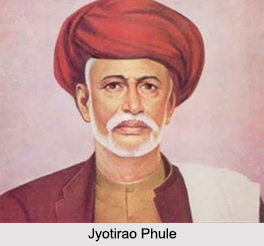 Contribution of Jyotirao Phule on education led to development of the society as a whole. Like Syed Ahmad Khan and Ram Mohan Roy, he saw access to modern education as crucial to the advancement of his people, who were the peasant masses of western India. Jyotirao Phule had the feeling rather a strong feeling that the society could not progress and prosper without the proper spread of education, especially among women.
Contribution of Jyotirao Phule on education led to development of the society as a whole. Like Syed Ahmad Khan and Ram Mohan Roy, he saw access to modern education as crucial to the advancement of his people, who were the peasant masses of western India. Jyotirao Phule had the feeling rather a strong feeling that the society could not progress and prosper without the proper spread of education, especially among women.
Jyotirao Phule"s quest for providing women and girls with right to education was supported by his wife Savitribai Phule. In 1851, Jyotiba established a girls" school at Bhide for untouchable girls and asked his wife to teach the girls in the school. Local upper-caste people objected to it, and he was asked to close the school, and quit the locality. He left the place, but soon he restarted the work after raising funds from prominent Europeans and Indians. Later, he opened two more schools for the girls and an indigenous school for the lower castes, especially for the Mahars and Mangs. Girls from different religions, castes and socio-economic background would come to study. However, the school was temporarily closed due to shortage of funds.
In 1854, Jyotirao Phule opened the first native library for low-caste students. In 1855, he started a night school at his house. After consistent efforts finally the government decided to provide ample fund for the purpose of education of the masses. In 1857, the Government allotted him a plot to set up a school.
Jyotirao Phule realised the pathetic conditions of widows and established an ashram for young widows and eventually became advocate of the idea of Widow Remarriage. Around his time, society was patriarchal and the position of women was terrible. Female infanticide was a common occurrence and so was child marriage, with children sometimes being married to men much older. These women often became widows before they even hit puberty and were left without any family support. Jyotirao was pained by their plight and established an orphanage in 1860 to shelter these unfortunate souls from perishing at the society"s cruel hands.
Jyotirao Phule was in favour of Western education and demanded free and compulsory primary education up to the age of 12. Jyotirao Phule advocated technical education for the lower classes. He also wanted education to be imparted to the children in rural areas.
Jyotirao felt that the objective to patronize education would prepare scholars who, it is thought, would in time vend learning without money and without price.






